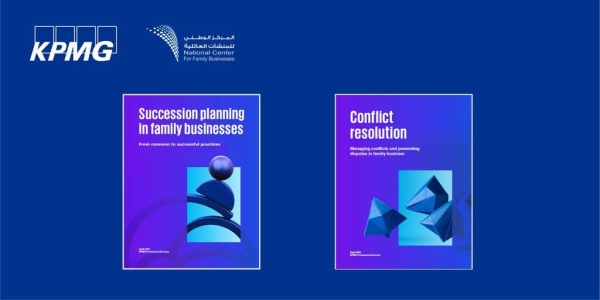
Family businesses in Saudi Arabia make up 63% of the private sector, bringing significant economic contributions to the economy. However, the survival rate of family businesses drops significantly as the business transitions from generation to generation.
Family businesses in the Kingdom are relatively young and have either gone through one succession or none yet but the theme of succession planning is becoming more prevalent. KPMG Professional Services in Saudi Arabia, and the National Center of Family Business (NCFB) teamed up to support the family business ecosystem, given their impactful role in their contribution to the economy and job creation.
Earlier, KPMG and NCFB signed a comprehensive agreement to examine family businesses in the Kingdom to design good governance strategy, smooth business transition and effective dispute resolution.
Dr. Ayth AlMubarak, CEO of NCFB, commented on the partnership: "We believe distinguished advisors and academics are essential elements for building an ecosystem to support the sustainability of family businesses in the kingdom. For this reason, we are pleased to collaborate with KPMG to further our understanding of family businesses in the Kingdom by conducting filed research with researchers and professional advisors in this field."
Accordingly, the NCFB and KPMG undertook a joint research project, led by two eminent Saudi researchers and practitioners in the family business field, namely Dr. Hanoof Abokhodair and Dr. Dalal Alrubaishi, working on two publications: one on succession planning and one on conflict resolution.
As part of these studies, the researchers conducted extensive interviews with family business leaders in Riyadh, Jeddah, and the Eastern Province.
Succession planning
One of the key characteristics that differentiate family from non-family businesses is the intention to transfer the business from one generation to the next in family businesses. It is through successful succession in each generation that family businesses are able to exist long – at times longer than the lifecycles of the industries in which they operate.
“Despite the importance of succession to the sustainability and longevity of family businesses, we observed through our experiences with business families in Saudi Arabia and neighboring countries that succession is a topic less spoken about when compared to governance, for example,” commented Dr. Hanoof Abokhodair, Co-Founder and Managing Partner of the Business Family House (BFH) and a Visiting Researcher at the American University of Sharjah.
The study shows that having a good governance framework does help answer some of the succession questions. However, governance structures and protocols, on their own, are insufficient to take a family and its business through the succession journey.
One of the conclusions of this research is that each business family is different and there is never a ‘one size’ which ‘fits all’ in these matters. Each family should find the right arrangement for a generational transition that suits their particular situation and conditions.
Different areas need to be addressed in the generational transition process of business families. These involve ownership and management succession, next-generation development and the preservation of the family values and legacy.
However, the most central of all, often overlooked, is to revisit the family’s objectives as they approach a generational transition and assess their objectives for the business.
Family businesses are not homogeneous groups of organizations; each family has different objectives for the family and the business that will affect their succession decisions. Therefore, there is no one clear succession process that all business families should follow.
Instead, families should first understand and agree on their objectives and vision for the future as a family in business to decide which route they will take in their succession journey.
“An effective next-generation development plan should support a smooth transition and strong maintenance of the family legacy and values,” added Dr. Abokhodair.
A set of decisions needs to be taken throughout the succession process, some of which are challenging decisions and some are emotional ones. Involving all family members in the succession decisions and keeping a culture of open communication and transparency is a key success factor in overcoming these challenges.
Capable advisors for business families will be able to assist family members in the most challenging part of the process, which is to build alignment around the different decisions and also to understand the long-term implications for the different choices on the particular family situation.
A well-prepared next generation is key to generational transitions. Apart from the preparation and grooming inside the family, in the present day there are many educational opportunities tailored to the needs of the next generation in business families.
“Overall, it is advisable that families take time off the operational world to contemplate the larger picture and think through the higher-level topics. This should help business families gain more clarity about the operational side of their daily activities. Research on family businesses is a good place for fresh ideas and lessons, while there are also professional advisors that can help families take some of these critical decisions,” stated Fuad Chapra, Head of Private Enterprise & Family Business at KPMG in Saudi Arabia.
Conflict resolution
“We have all heard stories of business empires that collapsed due to family feuds over the business,” found Dr. Dalal Alrubaishi, Associate Professor in Entrepreneurship and Family Businesses at Princess Nourah bint Abdulrahman University. “This makes conflict one of the greatest concerns that business families have. Conflict is indeed one of the most important challenges to understand in order for business families to protect against its destructive effects.”
This second study also builds on insights from academic research to support business families in changing how they think about conflict and finding ways to prevent and manage it through, illustrated with real-life and often vivid examples from the interviews with family business leaders.
Conflicts come in a variety of forms and at any point of time during the life cycle of the family business, whether during the founders’ stage or in subsequent generations. Different reasons trigger conflicts in business families. To prevent and manage conflict, the study found that it is crucial for business families to understand what type of conflict they are likely to face or will experience at a given time and situation.
The report identified five broad types of conflicts: conflict of interest, conflict of roles, conflict of goals, conflict over processes, and conflict in relationships.
“During our research and our interviews, we noted that conflicts in a family business are a wide and complex topic seldom tapped into,” added Dr. Alrubaishi. “Having established business and family governance tools are indeed known to greatly help minimize potential conflicts However, our research and practice found that they are not enough to prevent conflicts from arising, especially in families with relationship issues. Building a family with strong bonds has shown to be equally or even more important than governance protocols.”
When conflicts are already in the air, family businesses are advised to actively manage them before they turn into disputes by first employing previously developed conflict resolution protocols to understand their type of conflicts.












